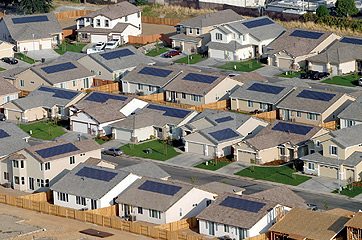

Cutting-edge energy management technologies will be rolled out to thousands of Australian households and business, and 250 schools, via a three-year project being led by Sydney-based software company Wattwatchers.
The ARENA-backed project will use Wattwatchers technology to monitor consumer energy data in real time, display it in apps and share it through a cloud based platform.
It will also give third parties like the Australian Energy Market Operator and network companies the opportunity to pay for access to that consumer data, and get better visibility of installed Distributed Energy Resources (DER) and how consumers are using them.
The data-driven platform, dubbed an ‘app store for energy’, will support several consumer-enabling apps for saving energy, bill reduction and solar optimisation, with dozens of further apps expected to be integrated over the life of the project.
At the core of the project are thousands of “internet of things” (IoT) energy devices, that will put real-time “granular” energy data into the hands of consumers, giving them the option to provide – and be paid for – demand response during peak energy usage periods.
“With more and better data, consumers will be better informed to buy their energy,” said Wattwatchers CEO Gavin Deitz in a statement on Thursday.
“They can identify and take action on energy efficiency opportunities, both behavioural and appliance-driven, and use energy at times that suit them.
“If they have solar, it helps to optimise it or add storage. If they don’t have solar, it helps to show if there is a good investment case.
“It will help homes and enterprises to prepare for electric vehicles, and other emerging services … such as aggregated load control programs and virtual power plants (VPPs), and also local and peer-to-peer trading schemes.
“Finally, it allows consumers to integrate energy into smart home automation, which is a missing component in the array of devices that are quickly finding their way into Australian homes, such as Amazon Echo, Google Home and Apple Homekit.”
On the other side of the equation, Deitz adds, this data will help the wider electricity system – and in particular those parties working to balance supply and demand.
“The network businesses and market operators currently have poor visibility of the low voltage grid, which is connected to over 10 million Australian consumer sites, and face a mission-critical challenge to both see and control DER as Australia moves to higher and higher penetration of renewable energy, especially small-scale solar,” he said.
Wattwatchers says the $8.2 million project will be formally launched in early 2020, and be rolled out to at least 5,000 homes and small businesses across Australia, as well as the 250 schools.
The $2.7 million in grant funding from ARENA will be used mostly as a means to offer discounts to participants – worth hundreds of dollars for households and small businesses, and around $2,000 for schools – on the technology and installation, and three years access to data and apps.
ARENA CEO Darren Miller said the project aligned with ARENA’s focus on integrating renewables into the electricity system.
“Whether it’s rooftop solar, battery storage, energy efficiency, controlling electricity loads and appliances remotely, or the uptake of electric vehicles, we need better data to effectively run the future grid consisting of more and more decentralised consumer energy assets,” he said.
“The Wattwatchers project is designed to provide both the data and consumer participation needed to manage an increasingly decentralised electricity system. This also aligns strongly with other ARENA-funded initiatives for DER, demand response and new marketplaces.”
Wattwatchers CEO Gavin Dietz said ARENA’s support was vital to running the project at commercial scale, and thus provide an unprecedented opportunity to test and refine energy engagement and literacy.
“Data is key to providing consumers with more market power in the new energy marketplace,’ Dietz said.
“Data supports more choice, especially where consumers own and control their own data, and can take it with them whenever they change their energy company. Data informs key actions to save money, avoid waste and cut carbon emissions.”
Sophie is editor of One Step Off The Grid and deputy editor of its sister site, Renew Economy. Sophie has been writing about clean energy for more than a decade.
This post was published on December 19, 2019 11:14 am
Rooftop solar installs hit the doldrums as consumers wait to see what the major parties…
Report warns excluding cooktops from residential gas phase-out could take a big bite out of…
US energy economist says we have got our electricity tariffs all wrong, by focusing almost…
Wayne Smith from the Smart Energy Council on what to expect from the federal home…
OpenSolar joins forces with LoanOptions.ai to help consumers access finance to invest in rooftop PV…
Both major political parties are being urged to cut the price of household solar batteries…